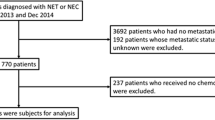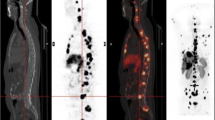Abstract
Gastroenteropancreatic neuroendocrine neoplasms (GEP-NENs) comprise a heterogeneous group of diseases. Advanced GEP-NENs are considered distinct disease entity with limited treatments. In this review, we will explore the biological rationale and clinical data of everolimus-based combinations for advanced GEP-NENs. PubMed/Medline, the Cochrane Library, and Google Scholar were searched using the terms “GEP-NENs” and “everolimus” and “systemic therapy” and selecting English literature only. Outcomes of interest included progression-free survival and overall survival (PFS and OS), toxicities, and tumor response. A total of 14 potentially relevant trials were initially identified, of which five studies were excluded. Hence, nine trials including 699 patients were included. Median PFS was reported in four out of the nine studies ranging from 14.6 to 16.4 months. The disease control rate was reported in all studies, and it ranged from 75 to 93 %. Frequently reported grade 3/4 toxicities were elevated transaminases, hyperglycemia, and hematologic toxicities. The presence of clinical and statistical heterogeneity of the primary studies precludes reliable evidence-based conclusions. Further well-conducted randomized controlled trials are awaited to better evaluate the treatment of GEP-NENs.



Similar content being viewed by others
References
Modlin IM, Oberg K, Chung DC, Jensen RT, de Herder WW, Thakker RV, et al. Gastroenteropancreatic neuroendocrine tumours. Lancet Oncol. 2008;9(1):61–72.
Kwekkeboom DJ, Kam BL, Van Essen M, Teunissen JJ, van Eijck CH, Valkema R, et al. Somatostatin receptor-based imaging and therapy of gastroenteropancreatic neuroendocrine tumors. Endroc Relat Cancer. 2010;17(1):R53–73.
Kaltsas GA, Besser GM, Grossman AB. The diagnosis and medical management of advanced neuroendocrine tumors. Endocr Rev. 2004;25(3):458–511.
Rindi G, Klöppel G, Alhman H, Caplin M, Couvelard A, De Herder WW, et al. TNM staging of foregut (neuro) endocrine tumors: a consensus proposal including a grading system. Virchows Arch. 2006;449(4):395–401.
Pape UF, Jann H, Müller-Nordhorn J, Bockelbrink A, Berndt U, Willich SN, et al. Prognostic relevance of a novel TNM classification system for upper gastroenteropancreatic neuroendocrine tumors. Cancer. 2008;113(2):256–65.
Rindi GUIDO, Falconi M, Klersy C, Albarello L, Boninsegna L, Buchler MW, et al. TNM staging of neoplasms of the endocrine pancreas: results from a large international cohort study. J Natl Cancer Inst. 2012;104(10):764–77.
Plockinger U, Rindi G, Arnold R, Eriksson B, Krenning EP, de Herder WW, et al. Guidelines for the diagnosis and treatment of neuroendocrine gastrointestinal tumours. A consensus statement on behalf of the European Neuroendocrine Tumour Society (ENETS). Neuroendocrinology. 2004;80(6):394–424. doi:10.1159/000085237.
Abdel-Rahman O, Fouad M. Bevacizumab-based combination therapy for advanced gastroenteropancreatic neuroendocrine neoplasms (GEP-NENs): a systematic review of the literature. J Cancer Res Clin Oncol. 2014. doi:10.1007/s00432-014-1757-5.
Öberg K. Biotherapies for GEP-NETs. Best Pract Res Clin Gastroenterol. 2012;26(6):833–41.
Ganetsky A, Bhatt V. Gastroenteropancreatic neuroendocrine tumors: update on therapeutics. Ann Pharmacother. 2012;46(6):851–62.
Shida T, Kishimoto T, Furuya M, Nikaido T, Koda K, Takano S, et al. Expression of an activated mammalian target of rapamycin (mTOR) in gastroenteropancreatic neuroendocrine tumors. Cancer Chemother Pharmacol. 2010;65(5):889–93.
Yao JC, Shah MH, Ito T, Bohas CL, Wolin EM, Van Cutsem E, et al. Everolimus for advanced pancreatic neuroendocrine tumors. N Engl J Med. 2011;364(6):514–23.
Wullschleger S, Loewith R, Hall M. TOR signaling in growth and metabolism. Cell. 2006;124:471–84.
Thoreen C, Chantranupong L, Keys HR, Wang T, Gray NS, Sabatini DM. A unifying model for mTORC1-mediated regulation of mRNA translation. Nature. 2012;485(7396):109–13.
Huang S, Houghton PJ. Inhibitors of mammalian target of rapamycin as novel antitumor agents: from bench to clinic. Curr Opin Investig Drugs. 2002;3:295–304.
Faivre S, Kroemer G, Raymond E. Current development of mTOR inhibitors as anticancer agents. Nat Rev Drug Discov. 2006;8:671–88.
Fazio N, Abdel-Rahman O, Spada F, Galdy S, De Dosso S, Capdevila J, et al. RAF signaling in neuroendocrine neoplasms: from bench to bedside. Cancer Treat Rev. 2014. doi:10.1016/j.ctrv.2014.06.009.
Mordret G. MAP kinase kinase: a node connecting multiple pathways. Biol Cell. 1993;79:193–207.
L′Allemain G. Deciphering the MAP kinase pathway. Program Growth Factor Res. 1994;5:291–334.
Meric-Bernstam F, Gonzalez-Angulo AM. Targeting the mTOR signaling network for cancer therapy. J Clin Oncol. 2008;13:2278–87.
Zitzmann K, Rüden J, Brand S, Goke B, Lichtl J, Spottl G, et al. Compensatory activation of Akt in response to mTOR and Raf inhibitors—a rationale for dual targeted therapy approaches in neuroendocrine tumor disease. Cancer Lett. 2010;295(1):100–9.
Leung DW, Cachianes G, Kuang WJ, Goeddel DV, Ferrara N. Vascular endothelial growth factor is a secreted angiogenic mitogen. Science. 1989;246:1306–9.
Abdel-Rahman O. Targeting vascular endothelial growth factor (VEGF) in gastric cancer; preclinical and clinical aspects. Crit Rev Oncol Hematol. 2014. doi:10.1016/j.critrevonc.2014.05.012.
Pinato DJ, Tan TM, Toussi ST, Ramachandran R, Martin N, Meeran K, et al. An expression signature of the angiogenic response in gastrointestinal neuroendocrine tumours: correlation with tumour phenotype and survival outcomes. Br J Cancer. 2014;110(1):115–22. doi:10.1038/bjc.2013.682. Epub 2013 Nov 14.
Kuiper P, Hawinkels LJ, de Jonge-Muller ES, Biemond I, Lamers CB, Verspaget HW. Angiogenic markers endoglin and vascular endothelial growth factor in gastroenteropancreatic neuroendocrine tumors. World J Gastroenterol. 2011;17(2):219–25. doi:10.3748/wjg.v17.i2.219.
Poncet G, Villaume K, Walter T, Pourreyron C, Theillaumas A, Lépinasse F, et al. Angiogenesis and tumor progression in neuroendocrine digestive tumors. J Surg Res. 2009;154(1):68–77. doi:10.1016/j.jss.2008.03.055. Epub 2008 Apr 29.
Takahashi Y, Akishima-Fukasawa Y, Kobayashi N, Sano T, Kosuge T, Nimura Y, et al. Prognostic value of tumor architecture, tumor-associated vascular characteristics, and expression of angiogenic molecules in pancreatic endocrine tumors. Clin Cancer Res. 2007;13(1):187–96.
Kasuya K, Nagakawa Y, Suzuki M, et al. Anti-vascular endothelial growth factor antibody single therapy for pancreatic neuroendocrine carcinoma exhibits a marked tumor growth-inhibitory effect. Exp Thermal Med. 2011;2(6):1047–52. Epub 2011 Sep 5.
Kasuya K, Nagakawa Y, Suzuki M, et al. Combination therapy of gemcitabine or oral S-1 with the anti-VEGF monoclonal antibody bevacizumab for pancreatic neuroendocrine carcinoma. Exp Thermal Med. 2012;3(4):599–602. Epub 2012 Jan 18.
Villaume K, Blanc M, Gouysse G, Walter T, Couderc C, Nejjari M, et al. VEGF secretion by neuroendocrine tumor cells is inhibited by octreotide and by inhibitors of the PI3K/AKT/mTOR pathway. Neuroendocrinology. 2010;91(3):268–78.
Valle JW, Eatock M, Clueit B, Gabriel Z, Ferdinand R, Mitchell S. A systematic review of non-surgical treatments for pancreatic neuroendocrine tumours. Cancer Treat Rev. 2014;40(3):376–89.
Fernandes I, Pacheco TR, Costa A, Santos AC, Fernandes AR, Santos M, et al. Prognostic significance of AKT/mTOR signaling in advanced neuroendocrine tumors treated with somatostatin analogs. Oncol Targets Ther. 2012;5:409.
Grozinsky-Glasberg S, Franchi G, Teng M, Leontiou CA, Dalino P, Salahuddin N, et al. Octreotide and the mTOR inhibitor RAD001 (everolimus) block proliferation and interact with the Akt-mTOR-p70S6K pathway in a neuro-endocrine tumour cell line. Neuroendocrinology. 2007;87(3):168–81.
Moher D, Liberati A, Tetzlaff J, et al. Preferred reporting items for systematic reviews and meta-analyses: the PRISMA statement. J Clin Epidemiol. 2009;62(10):006–1012.
Tejani MA, Saif MW. Pancreatic neuroendocrine tumors: does chemotherapy work? J Pancreas. 2014;15(2):132–4.
Lamarca A, Hubner RA, Valle JW. Looking beyond chemotherapy in patients with advanced, well-differentiated, pancreatic neuroendocrine tumors. J Oncol Pathol. 2014;2(1):15–25.
André N, Carré M, Pasquier E. Metronomics: towards personalized chemotherapy? Nat Rev Clin Oncol. 2014;11:413–31.
Yao JC, Shah M, Panneerselvam A, Chen D, Stergiopoulos S, Ito T, et al. The VEGF pathway in pancreatic neuroendocrine tumors: prognostic and predictive capacity of baseline biomarker levels on efficacy of everolimus analyzed from the radiant-3 study. Pancreas. 2013;42(2):386–7.
Hobday T, Rubin J, Holen K, et al. MC044 h, a phase II trial of sorafenib in patients (pts) with metastatic neuroendocrine tumors (NET): a phase II consortium (P2C) study. J Clin Oncol. 2007;25(18):4504.
Chan JA, Mayer RJ, Jackson N, Malinowski P, Regan E, Kulke MH. Phase I study of sorafenib in combination with everolimus (RAD001) in patients with advanced neuroendocrine tumors. Cancer Chemother Pharmacol. 2013;71(5):1241–6.
Chan JA, Ryan DP, Zhu AX, Abrams TA, Wolpin BM, Malinowski P, et al. Phase I study of pasireotide (SOM 230) and everolimus (RAD001) in advanced neuroendocrine tumors. Endroc Relat Cancer. 2012;19(5):615–23.
Bajetta E, Catena L, Fazio N, Pusceddu S, Biondani P, Blanco G, et al. Everolimus in combination with octreotide long-acting repeatable in a first-line setting for patients with neuroendocrine tumors: An ITMO group study. Cancer. 2014;120(16):2457–63.
Yao JC, Phan AT, Chang DZ, Wolff RA, Hess K, Gupta S, et al. Efficacy of RAD001 (everolimus) and octreotide LAR in advanced low-to intermediate-grade neuroendocrine tumors: results of a phase II study. J Clin Oncol. 2008;26(26):4311–8.
Chan JA, Blaszkowsky L, Stuart K, Zhu AX, Allen J, Wadlow R, et al. A prospective, phase 1/2 study of everolimus and temozolomide in patients with advanced pancreatic neuroendocrine tumor. Cancer. 2013;119(17):3212–8.
Pavel ME, Hainsworth JD, Baudin E, Peeters M, Hörsch D, Winkler RE, et al. Everolimus plus octreotide long-acting repeatable for the treatment of advanced neuroendocrine tumours associated with carcinoid syndrome (RADIANT-2): a randomised, placebo-controlled, phase 3 study. Lancet. 2011;378(9808):2005–12.
Yao J, Phan A, Hess K, Fogelman D, Jacobs C, Dagohoy C et al. (2010) Randomized run-in study of Bevacizumab and everolimus in low to intermediate- grade neuroendocrine tumor (lgneTs) using perfusion CT (pCT) as functional biomarker. http://www.nanets.net/nanets_cd/2010/pdfs/C36.pdf. Accessed 29 April 2014.
Dasari A, Phan A, Gupta S, Hess KR, Culotta KS, Rashid A, et al. A phase I study of the anti-IGF-1R monoclonal antibody (MoAb), IMC-A12 (I), and everolimus (E) in well-differentiated neuroendocrine tumors (WD NET). J Clin Oncol. 2014;32(23):8. MILL ROAD, STE 800, ALEXANDRIA, VA 22314 USA: AMER SOC CLINICAL ONCOLOGY.
Bergsland EK, Watt L, Ko AH, Tempero MA, Korn WK, Kelley RK. A phase II study to evaluate the safety and efficacy of RAD001 plus erlotinib in patients with well-differentiated neuroendocrine tumors (NET). J Clin Oncol. 2012;30 Suppl 4:abstr 285.
Raymond E, Dahan L, Raoul JL, Bang YJ, Borbath I, Lombard-Bohas C, et al. Sunitinib malate for the treatment of pancreatic neuroendocrine tumors. N Engl J Med. 2011;364(6):501–13.
Rinke A, Müller HH, Schade-Brittinger C, Klose KJ, Barth P, Wied M, et al. Placebo-controlled, double-blind, prospective, randomized study on the effect of octreotide LAR in the control of tumor growth in patients with metastatic neuroendocrine midgut tumors: a report from the PROMID study group. J Clin Oncol. 2009;27(28):4656–63.
Abdel-Rahman O, Fouad M. Risk of mucocutaneous toxicities in patients with solid tumors treated with everolimus; a systematic review and meta-analysis. Expert Rev Anticancer Ther. 2014;14(12):1529-36.
Raymond, E., Niccoli-Sire, P., Bang, Y., Borbath, I., Lombard-Bohas, C., & Valle, J. W. (2010, January) Updated results of the phase III trial of sunitinib (SU) versus placebo (PBO) for treatment of advanced pancreatic neuroendocrine tumors (NET). In ASCO 2010 Gastrointestinal Cancers Symposium Abstract (Vol. 127).
Marotta V, Franzese MD, Del Prete M, Chiofalo MG, Ramundo V, Esposito R, et al. Targeted therapy with kinase inhibitors in aggressive endocrine tumors. Expert Opin Pharmacother. 2013;14(9):1187–203. doi:10.1517/14656566.2013.796931.
Ramundo V, Del Prete M, Marotta V, Marciello F, Camera L, Napolitano V, et al. Impact of long-acting octreotide in patients with early-stage MEN1-relate duodeno-pancreatic neuroendocrine tumors. Clin Endocrinol (Oxf). 2014;80(6):850–5. doi:10.1111/cen.12411.
Marciello F, Di Somma C, Del Prete M, Marotta V, Ramundo V, Carratu A, et al. Combined biological therapy with lanreotide autogel and cabergoline in the treatment of MEN-1-related insulinomas. Endocrine. 2014;46:678–81.
Strosberg JR, Fine RL, Choi J, Nasir A, Coppola D, Chen DT, et al. First‐line chemotherapy with capecitabine and temozolomide in patients with metastatic pancreatic endocrine carcinomas. Cancer. 2011;117(2):268–75.
Ekeblad S, Sundin A, Janson ET, Welin S, Granberg D, Kindmark H, et al. Temozolomide as monotherapy is effective in treatment of advanced malignant neuroendocrine tumors. Clin Cancer Res. 2007;13(10):2986–91.
Abdel-Rahman O. Vascular endothelial growth factor (VEGF) pathway and neuroendocrine neoplasms (NENs): prognostic and therapeutic considerations. Tumor Biol. 2014;35(11):10615–25.
Conflicts of interest
None
Author’s contributions
OA: Provided the idea and study design and collected the data and wrote the manuscript.
MF: Collected the data and revised the manuscript.
Author information
Authors and Affiliations
Corresponding author
Rights and permissions
About this article
Cite this article
Abdel-Rahman, O., Fouad, M. Everolimus-based combination for the treatment of advanced gastroenteropancreatic neuroendocrine neoplasms (GEP-NENs): biological rationale and critical review of published data. Tumor Biol. 36, 467–478 (2015). https://doi.org/10.1007/s13277-015-3064-4
Received:
Accepted:
Published:
Issue Date:
DOI: https://doi.org/10.1007/s13277-015-3064-4




